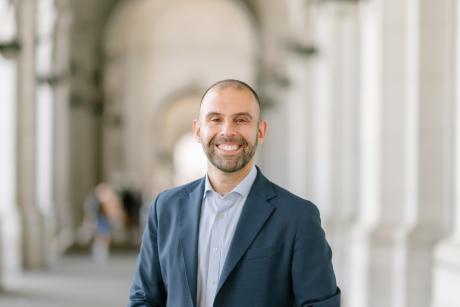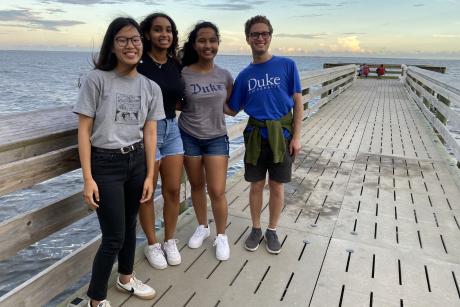
Capstone students hard at work on our projects.
Published March 12, 2018, last updated on March 14, 2018 under Voices of DGHI
By Elizabeth Wilkinson, senior global health and public policy major
At the end of four years of coursework and fieldwork, each undergraduate global health major reaches senior year with one last box left unchecked: the senior capstone. It is often the last class undergraduate global health majors take with DGHI, and it leaves a lasting impression on its students, including on me, a current student in Professor Dennis Clements’s course.
I have been consistently surprised and challenged by my experience in the senior capstone. Each student in the class is required to have a second major outside of global health, so everyone brings in a unique academic perspective. Our interests and involvements span across many areas of health, even within the global health major. The capstone offers us a chance to connect, share these diverse experiences and build a network of global health advocates before we step off campus.
The premise of the capstone is to create an evidence-based global health intervention with a team of classmates. My teammates and I share a background in public policy, so our intervention focuses on the policy area of criminal justice. Our population is incarcerated youth, and since local is global, our area of interest is Durham County, where Duke is located.
My group’s project proposes a mentorship program for youth transitioning out of incarceration. This intervention targets the multiple challenges youth face within and outside of detention, including lack of social support and mental health issues, which cause many to recommit offenses and return to the criminal justice system.
Neither my group members nor I had background knowledge about justice-involved youth, so we sought out many expert resources—and we were blown away by the positive response to our inquiries. Community advocates working on amazing job and life skills programs, psychiatrists, professors at Duke and beyond, school administrators and Durham justice system leaders made room in their busy schedules speak with us. We have built relationships and learned immensely from these experts.
In addition to our expert input, we have been exposed to interdisciplinary academic perspectives through our research; these include psychology, theology, ethics, criminal law, sociology and public policy.
My group is now working to incorporate all of these perspectives into a comprehensive intervention strategy. The issue of recidivism is multifaceted, and the process of whittling down a large body of information into one intervention has proven itself to be a difficult task.
We have been challenged to incorporate skills from our prior global health classes to make this project a success. One of my group members, Erika Brigantti, noted that an understanding of the social determinants of health is especially important, and that our global health path has enabled us “to think about things like the criminal justice system and draw those complex lines leading back to health and leading back to all of these different life outcomes.”
On an individual level, we have been humbled to learn about the justice-involved youth population and the complex issues they face both within and outside of the youth detention system. All of our group members live less than 10 minutes away from the Durham County Youth Home, a site of primary interest to our intervention plan, and yet none of us had known it was there prior to this project. The myriad issues these youth face right here in Durham were far from the forefront of my mind. It is out of a privileged ignorance, and it is a shame, that I did not know more about youth incarceration and its prevalence in my community.
As we grapple to understand new populations and to form our interventions, we have one assiduous supporter: our professor, Dr. Dennis Clements. He’s taught the course for many years, and he emphasizes the importance of building teamwork among his students. “Global health is a team-based sport,” he says. “If you go into public health or public policy, you’re going to be working in teams.”
Professor Clements puts great effort into choosing compatible teams, and it pays off. Past groups have produced projects with real-world success, including a bilingual pamphlet for the North Carolina Department of Health and Human Services promoting male HPV vaccination; a 12-week comprehensive curriculum to tackle substance abuse for the Lumbee Tribe in Fayetteville, which was implemented in their school system; and as recently as Fall 2017, a pitch to franchise Bull City Fit, a Durham-based obesity prevention and exercise promotion organization, in Goldsboro, North Carolina.
Professor Clements also cares greatly about his students and wants to see us succeed beyond our time at Duke. He asks the class for weekly updates on job interviews, graduate school acceptances, and more; he says he wants the students to “hear everybody’s victories.” He helps us grow our professional network by bringing past students into class to speak about their post-graduate activities. Professor Clements has created a supportive community to launch us into our careers and future plans.
He also treats us to coffee and delicious homemade baked goods to start our classes. (“I really am partial to the chocolate cheesecake,” he says. I concur.)

Dennis Clements presents his homemade chocolate cheesecake to his
capstone students on a Monday morning. Not pictured: fresh coffee!
As a second semester senior, I’ve become acutely aware of my limited time left at Duke. I am proud of my achievements here, but will always ask myself what more I could have done for my community. Whether you are a prospective global health major or currently well into the program, I encourage you to continuously seek out overlooked populations and learn about the issues they face. Underserved populations exist within and all around the Duke bubble. So start now, start local and keep learning.


